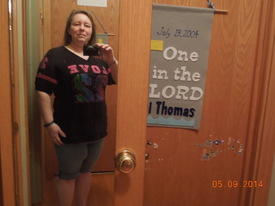Do I eat back those excersize calories or not?

AmyWininger
Posts: 150 Member
I keep seeing posts, and I read through them, and they say to eat the calories you burned from exercising back. But, I really don't understand. Say, for my case, I eat 1200 to 1500 calories a day. Maybe I did cycling that day, and burn around 600 calories. Do I eat those back? I just don't see how if you eat those, then how do you lose any weight? Won't it make your hard work go to waste?
Just saw how horribly I spelled my title. Sorry. exercise* xD
Just saw how horribly I spelled my title. Sorry. exercise* xD
0
Replies
-
I find it very confusing myself. In my case, I'm "supposed" to eat 1,200 calories a day. But, after I exercise, it raises that total to, say 1,700 and tells me my "remaining calories" is 500.
I'm like you in that I feel if I eat those extra calories, all I'm going to be doing is maintaining my weight and not losing anything. Anyone out there that can explain it to us?
Thanks,
Kasey0 -
MFP is set up with a calorie deficit already included. Say you pick the option that gives you 1200 calories, you could eat 1200 everyday and NOT exercise and you would lose weight. However exercising makes your calorie deficit even larger.
Make sense?0 -
81Katz is absolutely correct. It takes a 3500 calorie deficit per week to lose 1 pound. It takes a 7000 calorie deficit to lose 2 pounds per week. That works out to a deficit of 500 calories per day for 1 pound and 1000 calories per day for 2 pounds. Your sex, age, weight and activity level determine how many calories per day you need to maintain your weight. MFP figures that out, call it 2400 per day, then subtracts the 500 or 1000 and tells you to eat 1900 or 1400 respectively. These last numbers are what MFP shows you at the bottom of your diary. Any exercise over what you set as your activity level is then added back. Many people set their activity level as sedentary and then start exercising more. That is how you get the additional exercise calories.
I just wrote a thread several hours ago that explains what happens if you don't eat them back and maintain a NET 1200 calories per day. It can be found at http://www.myfitnesspal.com/topics/show/1096845-eating-back-exercise-calories
I hope that all of this makes sense.0 -
So, I need to eat enough back to get to at least 1200? So, If I eat 1500, then lose 600 from cycling, I'll be at 900? So, eat at least 300 more?0
-
It depends on the settings you selected when creating your goals. If you selected sedentary and add workouts, then by all means you should be eating those calories back. If you selected selected an activity level based on those workouts then you shouldn't be logging them or eating the extra calories. MFP has a deficit built in so you want to strive to NET 0 (without being obsessive). No matter what, you should be trying to eat at least 1200 calories in food daily; your body needs energy.0
-
How does MyFitnessPal work?
Last Updated: Sep 12, 2013 11:28AM PDT
Using MyFitnessPal is very simple. Here's how our basic process works:
1. Based on your fitness profile, we'll recommend a daily Net Calorie target for you to achieve your weight loss (or gain) goals.
2. As you eat and exercise throughout the day, you need to log your meals and exercise in our Food and Exercise diaries. MyFitnessPal will calculate the number of calories you've consumed from food and burned from exercise and let you know how many calories you have left to eat for the day. If you stick within your calorie limits, you should achieve the weight loss (or gain) you're looking for.
3. The best part of our system is that logging gets easier the more you do it. MyFitnessPal remembers the foods and exercises you like most and makes it easy for you to add those items to your diary. In just a few days, logging can be as fast as 30 seconds — it's literally that easy.
4. Periodically (we recommend once a week), you should weigh yourself and check-in your new weight with the site or the app using our Check-In feature (or "Progress" page in the app). Checking in your weight allows us to track your progress over time and also adjust your calorie goals to reflect your new weight.
That's it! Just a few minutes a day can show you so much about what you're eating and how that impacts your health.
*************************************************************
How does MyFitnessPal calculate my initial goals?
Last Updated: Sep 13, 2013 12:24AM PDT
When you create your profile, we ask you for your age, height, weight, gender, and normal daily activity level. We use these factors to determine the calories required to maintain your current weight. We also ask how much weight you would like to lose or gain per week, and with this goal in mind we subtract calories (for weight loss) or add calories (for weight gain) to determine your daily calorie and nutrient goals.
We ask for your goal weight when you create your profile, but this is only for purposes of reporting how many pounds remain until you meet your goal. Your goal weight does not affect our calorie calculations.
We also ask you for your weekly exercise goals, in order to provide an incentive for you to reach. We do not account for additional exercise outside of your reported daily activity level, until you log exercise to your diary under the "Cardiovascular" section. Please see this article to understand why we do not currently calculate calories burned via strength exercises.
Because your daily calorie goal already accounts for your intent to gain or lose weight at a particular rate, you can achieve your goal by eating the specified number of calories per day, with no additional exercise required. If you do exercise, then your daily calorie goal will increase for the day, to stabilize your weight loss or weight gain at the rate you initially specified.
We set your daily calorie goal in Net Calories which we define as:
Calories Consumed (Food) - Calories Burned (Exercise) = Net Calories
This means that if you exercise, you will be able to eat more for that day. For example, if your Net Calorie goal is 2000 calories, one way to meet that goal is to eat 2,500 calories of food, but then burn 500 calories through exercise.
Think of your Net Calories like a daily budget of calories to spend. You spend them by eating, and you earn more calories to eat by exercising. We do not recommend that any member consume fewer than 1200 net calories on any given day.
While the calorie goals we calculate for you are based on statistical averages, our millions of users have demonstrated that these goals are accurate enough to provide positive results for almost anyone.
However, if you would prefer a calorie goal that responds to your specific daily activity level, may we suggest looking into our third party integrations? Several of our integrations offer solutions for monitoring your calorie burn over the course of the day, and can update your MyFitnessPal calorie goals based on this information.
On the site you can find out more about our integrations at http://www.myfitnesspal.com/apps. In our iOS apps, tap "More" then "Get Started." In our Android app, open the menu drawer and tap "App Gallery."
If you are following a guided plan from your doctor or nutritionist, or if you have data that you believe is more accurate than our estimated goals, please see this article for information about customizing your goals.
************************************************************
What are Net Calories?
Last Updated: Jun 13, 2013 11:14AM PDT
We set your nutritional target in Net Calories which we define as:
Calories Consumed (Food) - Calories Burned (Exercise) = Net Calories
This means that if you exercise, you will be able to eat more for that day. For example, if your Net Calorie goal is 2000 calories, one way to meet that goal is to eat 2,500 calories of food, but then burn 500 calories through exercise.
Think of your Net Calories like a daily budget of calories to spend. You spend them by eating, and you earn more calories to eat by exercising. We do not recommend that any member consume fewer than 1200 net calories on any given day.
*****************************************************0 -
81Katz - Great post!!! Thank you for digging that up!!!0
-
It depends on the settings you selected when creating your goals. If you selected sedentary and add workouts, then by all means you should be eating those calories back. If you selected selected an activity level based on those workouts then you shouldn't be logging them or eating the extra calories. MFP has a deficit built in so you want to strive to NET 0 (without being obsessive). No matter what, you should be trying to eat at least 1200 calories in food daily; your body needs energy.
You do NOT want to net zero! You want to net you calorie goal. So for you it would be 1200 - 1500 a day. You should not go below that number. Netting 0 would be equivalent to not eating all day.0 -
Depending on what your settings are and what you'rer using to calculate your exercise calories from, I would eat back some. For example if i was using the MFP for my calories burned I'd definitely eat only a partial amount because I find that it overestimates for my activities.0
-
Okay, say your calorie goal for each day is 1500. It's the end of the day and you ate your 1500 calories...but then you go exercise and you burn 500 calories. Well, now you are down to 1000 calories for the day. You need to be at 1500 calories. So you need to consume an extra 500 calories so that you are back up to 1500. Just remember the 1500 is a goal that will make you lose weight no matter what. So ending your day at less than 1500 will cause you to possibly not feel well and make you lose weight too fast, etc. To be healthy and give your body the nutrients and calories it needs, you shouldn't go less than 1200. Good luck!0
-
This has been an issue for me too... thank you for all this great info!
 0
0 -
Maybe I did cycling that day, and burn around 600 calories.
If you eat them back, make damn sure you calculate them correctly.
If you're just going to enter things using the MFP database, divide whatever number they give you by 3.0 -
I'm still really confused!
I used a BMR calculator which said my BMR would be 1400 calories (ish) a day. I'm currently eating 1200 calories a day and have lost weight since i started,
Looking back, i have to have a defecit of 3500 calories a week to lose ilb so technically i would be eating 900 cals a day? (i wont because that would be stupid and irresponsible of me!)
i put my life as moderately active, with an active job that i do 3 times a week (12 hour shifts) and try and do a bit of biking or walking when at home.
So what do i do? am i skill going to lose? do i have to adjust my settings or continue at 1200/day?
I'm sure this has all been covered by previous comments but im not the brightest!:huh:0 -
I'm still really confused!
I used a BMR calculator which said my BMR would be 1400 calories (ish) a day. I'm currently eating 1200 calories a day and have lost weight since i started,
Looking back, i have to have a defecit of 3500 calories a week to lose ilb so technically i would be eating 900 cals a day? (i wont because that would be stupid and irresponsible of me!)
i put my life as moderately active, with an active job that i do 3 times a week (12 hour shifts) and try and do a bit of biking or walking when at home.
So what do i do? am i skill going to lose? do i have to adjust my settings or continue at 1200/day?
I'm sure this has all been covered by previous comments but im not the brightest!:huh:
Well for one you should never eat below your BMR which is the minimum calories you need to survive should you be in a coma. You should eat 15-20% less than your TDEE.0 -
Not sure how you ended up with the 1200 calorie daily goal, but you are a man, and that is absolutely not enough for you to be eating in a day.I find it very confusing myself. In my case, I'm "supposed" to eat 1,200 calories a day. But, after I exercise, it raises that total to, say 1,700 and tells me my "remaining calories" is 500.
I'm like you in that I feel if I eat those extra calories, all I'm going to be doing is maintaining my weight and not losing anything. Anyone out there that can explain it to us?
Thanks,
Kasey0 -
Thank you for explaining that, I was wondering about that as well.0
-
I'm still really confused!
I used a BMR calculator which said my BMR would be 1400 calories (ish) a day. I'm currently eating 1200 calories a day and have lost weight since i started,
Looking back, i have to have a defecit of 3500 calories a week to lose ilb so technically i would be eating 900 cals a day? (i wont because that would be stupid and irresponsible of me!)
i put my life as moderately active, with an active job that i do 3 times a week (12 hour shifts) and try and do a bit of biking or walking when at home.
So what do i do? am i skill going to lose? do i have to adjust my settings or continue at 1200/day?
I'm sure this has all been covered by previous comments but im not the brightest!:huh:
BMR = calories your body uses if you did ZERO activity.
TDEE = BMR + activity + exercise........take 500 calories away from THIS number.
Large deficits = fat+muscle loss.......really no point in working out if you're just going to torch muscle (oh but the scale looks good)
,
Moderate deficits+exercise+protein = spares muscle mass.
Use your BMR as a guage....on whether or not your deifit is large or moderate. Below BMR - definitely a larger deficit.0 -
OOOOH! boy do I feel like an idiot!
I understand now, thanks for the explanation!0 -
I am not sure how it works, but I have not been eating my exercise calories! I didn't think I was supposed to....
What I don't understand is why MFP wants to INCREASE my calorie intake each time I loose another 10 pounds. When I still have 70 lbs to loose - why would I want to increase my calories?0 -
Okay, say your calorie goal for each day is 1500. It's the end of the day and you ate your 1500 calories...but then you go exercise and you burn 500 calories. Well, now you are down to 1000 calories for the day. You need to be at 1500 calories. So you need to consume an extra 500 calories so that you are back up to 1500. Just remember the 1500 is a goal that will make you lose weight no matter what. So ending your day at less than 1500 will cause you to possibly not feel well and make you lose weight too fast, etc. To be healthy and give your body the nutrients and calories it needs, you shouldn't go less than 1200. Good luck!
Thanks. This has made the most sense to me out of all the replies 0
0 -
bump0
-
I am not sure how it works, but I have not been eating my exercise calories! I didn't think I was supposed to....
What I don't understand is why MFP wants to INCREASE my calorie intake each time I loose another 10 pounds. When I still have 70 lbs to loose - why would I want to increase my calories?
You might need to look at resetting your weekly weight loss goals.
At 70 to go a 1.5 pound per week goal is pretty decent.0
This discussion has been closed.
Categories
- All Categories
- 1.4M Health, Wellness and Goals
- 398.5K Introduce Yourself
- 44.7K Getting Started
- 261K Health and Weight Loss
- 176.4K Food and Nutrition
- 47.7K Recipes
- 233K Fitness and Exercise
- 462 Sleep, Mindfulness and Overall Wellness
- 6.5K Goal: Maintaining Weight
- 8.7K Goal: Gaining Weight and Body Building
- 153.5K Motivation and Support
- 8.4K Challenges
- 1.4K Debate Club
- 96.5K Chit-Chat
- 2.6K Fun and Games
- 4.8K MyFitnessPal Information
- 18 News and Announcements
- 21 MyFitnessPal Academy
- 1.5K Feature Suggestions and Ideas
- 3.2K MyFitnessPal Tech Support Questions
















